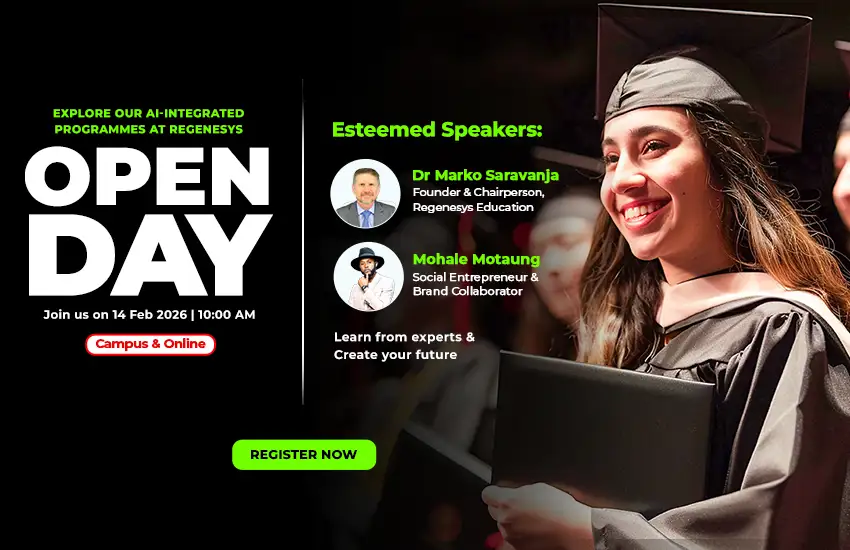We all have a complicated relationship with the news. Some wake up and check several apps before brushing their teeth. Others scroll past every headline, diving straight into TikTok or sports updates. And some keep the news on in the background, loud enough to feel informed but not enough to absorb the anxiety.
No matter your habit, one thing is clear: the headlines shape our lives. Trade tariffs, rising interest rates, community protests, shifting government coalitions. The news does more than inform us, it impacts us. Yet many of us do not notice the lessons it holds until it is too late.

Leadership begins with awareness, but it cannot end there. Staying informed is a solid starting point. True leadership demands more. It requires thinking critically, questioning assumptions, connecting the dots, and taking decisive action, especially in a country like South Africa where the social and political landscape shifts faster than we can refresh our feeds. Let’s take a closer look at where we are right now
The News Is a Mirror. But Only for Those Willing to Look Closely

In recent weeks, South Africa’s National Dialogue, originally positioned as a unifying effort, has quickly unravelled. Key political parties, including the Democratic Alliance (DA), Freedom Front Plus (FF +), and ActionSA, have withdrawn. They cited concerns around lack of transparency, a rushed timeline, and an eye-watering R700 million budget. What began as an inclusive vision now feels more like political theatre.
At the same time, South Africa faces a glaring dilemma at the intersection of economic sovereignty and global diplomacy. The United States has imposed a sweeping 30 percent tariff on South African exports. This places roughly 30,000 jobs at risk and impacts critical industries such as agriculture, automotive, wine, and marine manufacturing.
Meanwhile, the Government of National Unity is beginning to show ideological cracks. The ANC and DA are struggling to find common ground on issues like economic reform and public service delivery. Concerns are growing over whether this coalition can hold.
To some, these developments may look like politics as usual. But for leaders, particularly those in business and strategy, these headlines offer important lessons in trust, resilience, adaptability, and foresight.
Leadership Leaves a Legacy. Even When No One Is Watching

Not all headlines explode overnight. Some begin years earlier, in the quiet corners of policy meetings, budget speeches, and legislative votes. Decisions that once seemed distant or irrelevant often return with long shadows, shaping the reality we live in today.
Take the cadre deployment policy, for instance. Originally introduced by the ANC to align public service appointments with party objectives, it was never just a staffing strategy. Over time, it contributed to widespread allegations of state capture, weakened institutional integrity, and a crisis of public trust. Zondo Commission findings have highlighted how this policy impacted key state institutions. Today, we are still dealing with its aftershocks in the form of corruption inquiries, service delivery breakdowns, and a talent vacuum in state entities.
Consider the National Health Insurance Act, signed into law on 15 May 2024. It aims to establish universal health coverage by creating a single, state-managed fund to purchase healthcare services for all, which is a bold move toward equity. At the same time, questions around how it will be funded and its impact on private medical schemes have sparked nuanced and ongoing debate.
The same can be said of the 30 percent subject pass requirement in the National Senior Certificate. While often misunderstood as the overall pass mark, this threshold applies to specific subjects and allows learners to progress with limited proficiency. The policy has existed since the early 2000s but concerns around its long-term effects on academic preparedness and employability have gained momentum. Educational analysts argue that while inclusive, the low benchmark may contribute to a misalignment between qualifications and real-world readiness. Government officials maintain that it ensures wider access and opportunities, though the debate continues.
Even decisions around state-owned enterprises, from bailouts to board appointments continue to reverberate. Eskom’s long-standing governance issues did not begin with load-shedding. They stem from years of leadership missteps, poor risk oversight, and political interference. Auditor-General reports and public investigations show how decisions made years ago still shape our energy reality today. Every flicker of the lights reminds us that leadership choices compound over time.
This is the long game of leadership. When leaders fail to think beyond their term limits, societies end up paying the price for decades. And when they get it right, the return is felt for generations.
Awareness Is Not Leadership. Action Is

Knowing what is happening is important. But knowing what to do with that knowledge, that’s leadership. In business, politics, education, or civil society, the gap between information and impact is often filled by one thing: decision-making.
Yet, decision-making in complex environments like South Africa’s doesn’t come from instinct alone. It requires pattern recognition, ethical clarity, historical awareness, and a systems-level mindset. This is why simply “being informed” is no longer enough. Leaders must move from consumption to comprehension, and from comprehension to contribution.
When policies unravel or protests erupt, it’s not enough to tweet an opinion or quote a headline. We need leaders who can trace the why, navigate the how, and propose the what-next. Whether you’re managing a business, shaping policy, or leading within your community, your ability to connect the dots determines your effectiveness.
So, the next time you read a headline about tariffs, governance, education, or energy, ask yourself: what is the lesson beneath the newsflash? What conditions allowed this to unfold? Who does it affect, and what does it signal for the future?
These are the questions that leaders ask. And they don’t wait for perfect information. They act with informed intent.
The Cost of Disengagement

Disengagement doesn’t always look like apathy. Sometimes it sounds like “It’s not my problem,” or “Politics isn’t really my thing,” or “That’s just how things are.” But in a democracy, silence is never neutral. It is interpreted, filled in, and acted upon usually by those whose interests are most organised.
When citizens disengage, the consequences show up in more than just the ballot box. They show up in underfunded schools, neglected infrastructure, unreliable utilities, and a shrinking middle class. When business leaders disengage, they risk being outpaced by regulatory shifts they didn’t anticipate. When young professionals disengage, the future is shaped without their voice in the room.
Disengagement may offer temporary relief from complexity, but it creates long-term exposure to risk. And in South Africa, where every policy shift carries economic, ethical, and human weight, that exposure is growing.
But here’s the opportunity: informed, engaged leadership is a competitive advantage. Leaders who understand the interplay between politics, economics, and society are better equipped to adapt, influence, and build with purpose.
If this moment has taught us anything, it’s that South Africa doesn’t need more spectators. It needs more strategic thinkers. More ethical decision-makers. More leaders who understand that real impact happens not in isolation, but at the intersection of ideas, systems, and people. That kind of leadership isn’t instinctive, it’s cultivated.
Shaping the Future Starts Here

The Bachelor of Commerce in Politics, Philosophy and Economics (PPE) at Regenesys aims to build exactly that. It’s for students who want to lead not just in theory, but in reality. It combines political insight, economic reasoning, and philosophical depth to shape leaders who can make sense of complex systems and respond with clarity, conscience, and competence.
And for professionals ready to take their public leadership journey further, Regenesys also offers the Postgraduate Diploma in Public Management and Master of Public Management, advanced programmes built to equip managers, policymakers, and public sector leaders with the tools to navigate governance, service delivery, and institutional reform in today’s rapidly evolving context.
These qualifications are springboards for future ministers, directors-general, corporate affairs leads, NGO founders, and development finance strategists. They are for those who refuse to be passive recipients of the future and instead choose to help define it.






